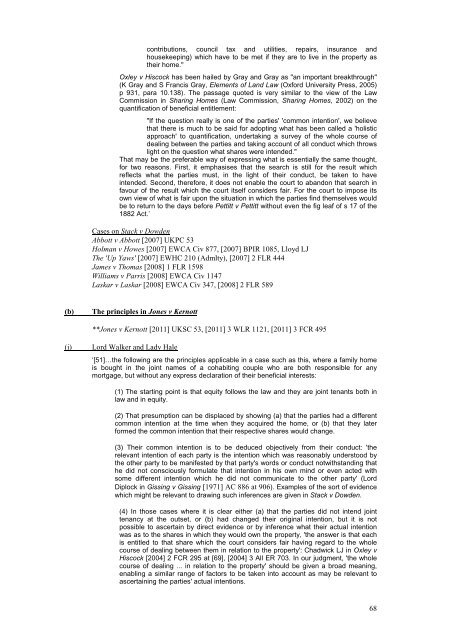Soton Equity and Trusts - alastairhudson.com
Soton Equity and Trusts - alastairhudson.com
Soton Equity and Trusts - alastairhudson.com
Create successful ePaper yourself
Turn your PDF publications into a flip-book with our unique Google optimized e-Paper software.
contributions, council tax <strong>and</strong> utilities, repairs, insurance <strong>and</strong><br />
housekeeping) which have to be met if they are to live in the property as<br />
their home."<br />
Oxley v Hiscock has been hailed by Gray <strong>and</strong> Gray as "an important breakthrough"<br />
(K Gray <strong>and</strong> S Francis Gray, Elements of L<strong>and</strong> Law (Oxford University Press, 2005)<br />
p 931, para 10.138). The passage quoted is very similar to the view of the Law<br />
Commission in Sharing Homes (Law Commission, Sharing Homes, 2002) on the<br />
quantification of beneficial entitlement:<br />
"If the question really is one of the parties' '<strong>com</strong>mon intention', we believe<br />
that there is much to be said for adopting what has been called a 'holistic<br />
approach' to quantification, undertaking a survey of the whole course of<br />
dealing between the parties <strong>and</strong> taking account of all conduct which throws<br />
light on the question what shares were intended."<br />
That may be the preferable way of expressing what is essentially the same thought,<br />
for two reasons. First, it emphasises that the search is still for the result which<br />
reflects what the parties must, in the light of their conduct, be taken to have<br />
intended. Second, therefore, it does not enable the court to ab<strong>and</strong>on that search in<br />
favour of the result which the court itself considers fair. For the court to impose its<br />
own view of what is fair upon the situation in which the parties find themselves would<br />
be to return to the days before Pettitt v Pettitt without even the fig leaf of s 17 of the<br />
1882 Act.’<br />
Cases on Stack v Dowden<br />
Abbott v Abbott [2007] UKPC 53<br />
Holman v Howes [2007] EWCA Civ 877, [2007] BPIR 1085, Lloyd LJ<br />
The 'Up Yaws' [2007] EWHC 210 (Admlty), [2007] 2 FLR 444<br />
James v Thomas [2008] 1 FLR 1598<br />
Williams v Parris [2008] EWCA Civ 1147<br />
Laskar v Laskar [2008] EWCA Civ 347, [2008] 2 FLR 589<br />
(b)<br />
The principles in Jones v Kernott<br />
**Jones v Kernott [2011] UKSC 53, [2011] 3 WLR 1121, [2011] 3 FCR 495<br />
(i)<br />
Lord Walker <strong>and</strong> Lady Hale<br />
‘[51]…the following are the principles applicable in a case such as this, where a family home<br />
is bought in the joint names of a cohabiting couple who are both responsible for any<br />
mortgage, but without any express declaration of their beneficial interests:<br />
(1) The starting point is that equity follows the law <strong>and</strong> they are joint tenants both in<br />
law <strong>and</strong> in equity.<br />
(2) That presumption can be displaced by showing (a) that the parties had a different<br />
<strong>com</strong>mon intention at the time when they acquired the home, or (b) that they later<br />
formed the <strong>com</strong>mon intention that their respective shares would change.<br />
(3) Their <strong>com</strong>mon intention is to be deduced objectively from their conduct: 'the<br />
relevant intention of each party is the intention which was reasonably understood by<br />
the other party to be manifested by that party's words or conduct notwithst<strong>and</strong>ing that<br />
he did not consciously formulate that intention in his own mind or even acted with<br />
some different intention which he did not <strong>com</strong>municate to the other party' (Lord<br />
Diplock in Gissing v Gissing [1971] AC 886 at 906). Examples of the sort of evidence<br />
which might be relevant to drawing such inferences are given in Stack v Dowden.<br />
(4) In those cases where it is clear either (a) that the parties did not intend joint<br />
tenancy at the outset, or (b) had changed their original intention, but it is not<br />
possible to ascertain by direct evidence or by inference what their actual intention<br />
was as to the shares in which they would own the property, 'the answer is that each<br />
is entitled to that share which the court considers fair having regard to the whole<br />
course of dealing between them in relation to the property': Chadwick LJ in Oxley v<br />
Hiscock [2004] 2 FCR 295 at [69], [2004] 3 All ER 703. In our judgment, 'the whole<br />
course of dealing ... in relation to the property' should be given a broad meaning,<br />
enabling a similar range of factors to be taken into account as may be relevant to<br />
ascertaining the parties' actual intentions.<br />
68













